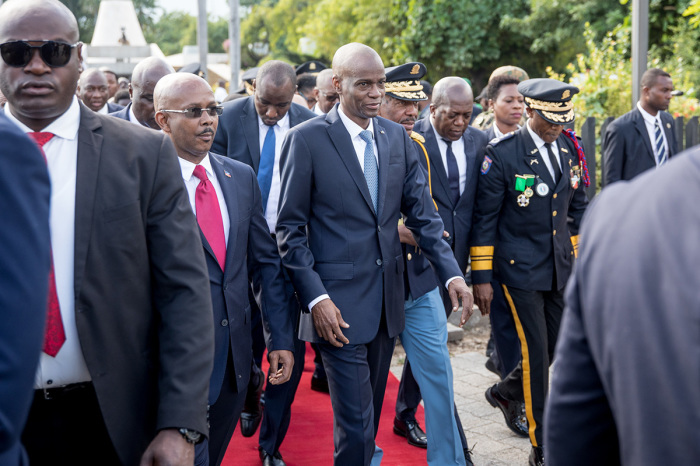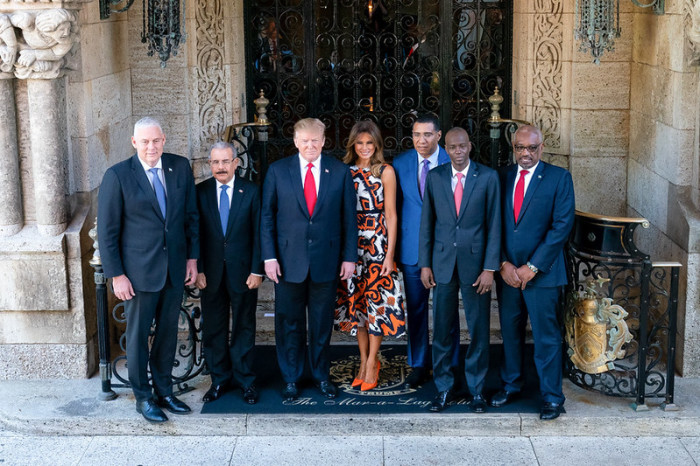4 suspects killed, 2 arrested in assassination of Haitian president as faithful and political react

Four suspects in the assassination of Haitian President Jovenel Moïse were killed during a gun battle with police and two others were arrested, local authorities said Wednesday as the faithful and political continue to react to his death.
“The police are engaged in a battle with the assailants,” Haiti’s Police Chief Léon Charles said at a news conference late Wednesday. “We are pursuing them so that, in a gunfight, they meet their fate or in gunfight they die, or we apprehend them.”
The late Haitian president was assassinated in an attack on his private residence in the hills above Port-au-Prince at about 1 a.m. local time, the BBC reported. Magistrate Carl Henry Destin told Le Nouvelliste newspaper that Moïse died at the scene and his body had 12 bullet wounds. He further noted that the president's office and bedroom were ransacked and he was found lying on his back, covered in blood.
The late president’s wife, Martine Moïse, who was injured in the brazen attack, was transported to a hospital in South Florida, where she is said to be in critical but stable condition. The couple’s three children — Jomarlie, Jovenel Jr. and Joverlein — are reportedly being kept in a “safe location.”
As many in the Haitian diaspora try to process the killing of the Haitian leader, reactions have been mixed.

At the Notre Dame d’Haiti Catholic Church in Miami’s Little Haiti neighborhood Wednesday, members of the diaspora observed a moment of silence for Moïse, Local 10 reported. The Rev. Reginald Jean Mary also asked parishioners to pray for Martine Moïse.
“Until when do we have to suffer? Until when will we continue to kill one another? Until when can we be one, Jesus?” Jean Mary said in his public prayer.
Leonie Hermantin, a Haitian community leader in Miami, told The New York Times that Moïse took on many projects in the northwest of Haiti, where he is from, and was popular among the working class and South Florida.
“To some he was a corrupt leader, but to others he was a reformer. He was a man who was trying to change the power dynamics, particularly when it came to money and who had control over electricity contracts,” Hermantin said.
Dahoud André, a Haitian radio host from Brooklyn, New York, told the publication that he was overjoyed by the news that Moïse is dead.
“There will be celebrations on the streets of New York,” he said, noting how Moïse had won the 2016 elections with just under 600,000 votes in a country of 11 million people.
“We believe it is a good thing for the Haitian people that Jovenel Moïse is dead,” he said. “He was a criminal, who never had any legitimacy and under his leadership, there have been massacres, and corruption, and the arming and financing of street gangs. The only people mourning will be those who were helping him to steal.”
Frantz Benjamin, a Haitian-Canadian member of the provincial Parliament for the Quebec Liberal Party, said Moïse’s assassination is not a good development for the Caribbean nation.
“Whether you supported him or not, no one is a winner from this, there is no joy,” he said. “If you can kill a president, you can kill anyone.”
Moïse was killed as he pursued an aggressive agenda that included rewriting the country’s Constitution, The New York Times reported. It was not a move that was supported by the United States or some local religious leaders. Critics feared that he was setting the country down a path toward authoritarian rule and threatened the nation's democracy.
The late president had been known to use gangs to repress political opponents, according to the U.S. government. Last year, the U.S. Treasury sanctioned two senior Haitian officials for allegedly planning the 2018 La Saline massacre," The Wall Street Journal reported.
In that massacre civilians, including children, were taken from their homes and executed in the streets. Their bodies were then burned and dismembered, the U.S. Treasury said.
Laurent Lamothe, a former prime minister of Haiti, told ABC News he was “devastated” by Moïse’s death. He suggested it was Moïse’s push for reforms that triggered his death and now the country is in “mourning.”
“I was completely devastated and the country, the people are devastated. Haiti is in mourning. It is a sad day for Haiti and for Haitians,” he said.
“The president was leading many fights on many fronts for reforms and he wanted to do it in different sectors of the economy and he had received threats. So he was aware that he was in a dangerous and tenuous situation. And they carried out on some of those threats. So now an investigation has to [occur] to find out who did it. Who paid for it and for those persons to be held accountable,” Lamothe said.
Among those who did not support Moïse were religious leaders who called on him to step down just months before he was killed as the country faced what some describe as a “descent into hell” amid rising political tensions and violence.
The Bishops' Conference of Haiti said the proposed changes to the country’s Constitution, while in the middle of a national socio-political crisis, were not wise, Vatican News said. In a Feb. 2 statement, the Conference said that violence had escalated under Moïse’s rule, and the Haitian people were bearing the brunt of it.
“The daily life of the Haitian people is reduced to death, murders, impunity and insecurity,” the Haitian Bishops' Conference wrote, according to Fides News Agency. “Discontent is everywhere, in almost all areas.”
In March, the Haitian Conference of Religious echoed the alarm raised by the country's bishops and called on Moïse to step down as his political opposition claimed that his five-year term had expired on Feb. 7.
"No serious decisions have been taken to alleviate the suffering of the people or to protect them from aggression," the CHR asserted in their letter. “The only thing that seems to be of concern to you, is to carry out your so-called mandate at all costs, against the legitimate request of an entire people."
On Wednesday, Pope Francis called Moïse’s assassination “heinous” and expressed condolences “to the Haitian people and to his wife, who was also seriously wounded and whose life he commends to God.”
He furthered condemned “all forms of violence as a means of resolving crises and conflicts,” and wished the Haitian people “a future of fraternal harmony, solidarity and prosperity.”
Lamothe said the U.S., which he called a great “ally” of Haiti, could help the country at this time by providing support with security and help with the upcoming presidential elections scheduled for September.
“This was a very well financed and coordinated attack to kill the president of the country. That was a targeted attack. It was hired guns that carried out this work. The people of Haiti, what they want, they want peace, they want an environment conducive to being able to find jobs and they want security,” he said.





























